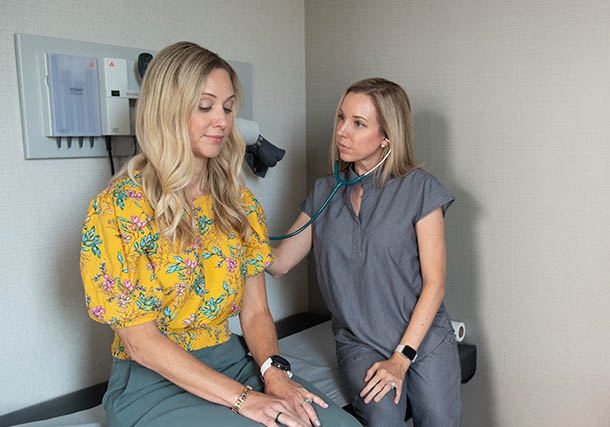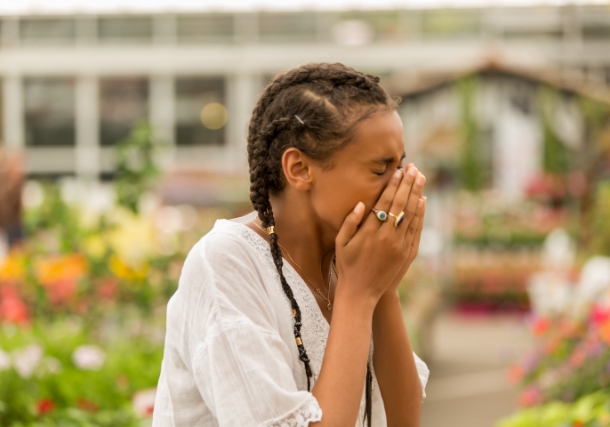
Eye Allergy Treatment in Charlotte
Eye allergies can be a frustrating condition for many individuals, whether they are seasonal or otherwise. Even mild symptoms, such as itchy or watering eyes, can be uncomfortable and interfere with daily life. At Carolina Asthma & Allergy Center, we understand the impact that eye allergies can have on your health and well-being, and we are committed to providing comprehensive care to help manage and treat this condition.
Our team of board-certified allergists and experienced healthcare professionals is dedicated to providing personalized treatment plans and ongoing support to help you live your life to the fullest. Whether you are seeking a diagnosis, treatment, or ongoing management of your eye allergies, we are here to help you every step of the way.
How to Request an Appointment
At Carolina Asthma and Allergy Center, we offer comprehensive evaluation and treatment for eye allergies. If you suspect you may have an eye allergy or have experienced symptoms that may be related to environmental conditions, you can request an appointment with our team of board-certified allergists and experienced healthcare professionals.
To schedule an appointment, you can call our office or fill out the online appointment request form on our website. Our friendly staff will work with you to find a convenient date and time for your visit.
During your appointment, our allergists will review your medical history, perform a physical exam, and conduct any necessary tests to determine if you have an eye allergy. Based on your evaluation, our team will develop a personalized treatment plan to help manage your symptoms and prevent future allergic reactions.
What are Eye Allergies?
Eye allergies, also referred to as ocular allergies or allergic conjunctivitis, are fairly common. There are two types of eye allergies: seasonal and perennial. Seasonal allergies typically occur from spring until fall, while perennial allergies usually occur year-round. Triggers for seasonal eye allergies include pollen from grass, trees and weeds, while triggers for perennial allergies include dust mites, pet dander and mold. Symptoms of eye allergies vary from person to person, as well as treatment plans for relief, and should be discussed with your allergist.

What are the Symptoms of Eye Allergies?
It’s important to discuss your eye allergy symptoms with an allergist. Common symptoms of eye allergies include the following:
- Red, itchy eyes
- Burning or watering eyes
- Light sensitivity
- Swollen eyelids
- Mucous production
Certain, more severe, effects on the eyes are not typical symptoms of eye allergies, including:
- Blurred vision
- Double vision
- Eye pain
If you experience any of these symptoms, you should seek immediate medical care. Please contact Carolina Asthma and Allergy Center as soon as possible to schedule an appointment.
Eye Allergy Testing in Charlotte
If your eye allergy cannot be diagnosed simply be an assessment of your medical history during a consultation, allergy testing may be ordered by your allergist. These tests are used to identify what exactly is causing your eye allergies, which could be anything from pollen to pet dander.
A skin prick test is performed by placing an allergen on your skin and then lightly scratched. This will more than likely be the type of test administered for eye allergies caused by environmental conditions.
By working with the certified allergists at Carolina Asthma and Allergy Center, you’ll get clear information about any potential eye allergy you have as well as what your options may be for avoiding risks. Our team will create a personalized management plan to ensure your lifestyle continues as normal. It’s important to schedule a consultation with our team as soon as possible to discuss the possible options available in your case.
How Can You Prevent and Treat Eye Allergies?
Eye allergy treatment will depend on the cause and severity of symptoms. Individuals may find relief by controlling environmental factors. For example:
- Keep doors and windows closed
- Wash sheets and bedding often and in hot water
- Keep pets out of bedrooms
- Eliminate water leaks in your home
- Use a dehumidifier
In addition, home remedies such as applying a cold compress to the eyes, eye drops, antihistamines or nasal corticosteroids may help you find relief. If your eye allergy symptoms are severe, your allergist may recommend allergy shots.
Allergy shots build up your immune system over time and develop a tolerance to you allergen, however, they are not a cure for allergies, and eye allergies can typically be managed with less regimented treatments.
Summary
At Carolina Asthma and Allergy Center, we are dedicated to providing compassionate care and ongoing support to help you live your life to the fullest. Contact us today to request an appointment and take the first step towards managing your eye allergies.
Eye Allergy FAQs
How are eye allergies diagnosed?
Oftentimes, allergists can diagnose an eye allergy by reviewing your medical history. In some cases, however, allergy testing may be necessary. Testing for eye allergies can help identify what is triggering symptoms to come up with the best solution for treatment.
What causes eye allergies?
Eye allergies occur when an allergen irritates your eye, specifically the conjunctiva, which covers a portion of the eye and inner surface of the eyelid. Triggers for seasonal eye allergies include pollen from grass, trees and weeds, while triggers for perennial allergies include dust mites, pet dander and mold.
Can eye allergies be prevented?
Individuals may find relief by controlling environmental factors, taking over-the-counter antihistamines, or, if severe, by taking allergy shots, but there is no exact method of preventing eye allergies completely.



